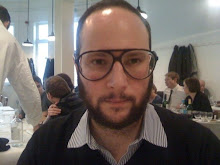
gallery from outside, (it used to be black) painted white by Elmgreen and Dragset (they also painted the inside black)


David Lamelas, Limite de una proyeccion (Limit of a projection 1), 1967

Xenia Kalpaktsoglou, co-director of Athens Biennal, with Andreas Angelidakis, listening to Alexandre Da Cunha's sound piece
THIS IS NOT A VOID
25 October 2008 - 22 January 2009
Opening Reception
24 October September 7 – 10pm
Artur Barrio, Laura Belém, Arabella Campbell, Iván Yoan Capote, Alexandre da Cunha, Martin Creed, Guy Debord, Gino de Dominicis, Marcel Duchamp, Elmgreen Dragset, Robert Filliou, Claire Fontaine, Aurélien Froment, Ryan Gander, Mario Garcia Torres, Loris Gréaud, Jordan Kantor, Paul Kos, David Lamelas, Adriana Lara, Tonico Lemos Auad, Tim Lee, Jac Leirner, David Lieske, Mateo López, Renata Lucas, Kris Martin, Robert Morris, Roman Ondák, Fernando Ortega, Kirsten Pieroth, Marco Rountree, Tino Sehgal, Mark Soo, Jan Timme, Ian Wilson, Cerith Wyn Evans
Curated by Jens Hoffmann
This Is Not a Void is an exhibition without objects, it presents an empty gallery space filled with immaterial art works. Bringing together a large number of pieces by more than 30 international artists, the exhibition focuses on thematizing the notion of the void when creating a physically empty space "full" of artworks that are dematerialized, immaterial, or ephemeral, and therefore imperceptible.
In the visual arts, a frequent point of reference for the idea of the void is the series of black paintings begun by the Russian artist Kazimir Malevich in 1915. His black squares marked ground zero in the emerging modernist focus on pure form and color; their dark voids were full of potential for a more abstract and conceptual approach to art making. Following this important negation of the representational in painting came the negation of the object in space, marked by the arrival of Conceptual art in the late 1960s, which examined analytically not only the parameters of the artwork itself but also the environment and the structures in which it is created and presented. This is part of the art historical legacy that This Is Not a Void connects with.
This Is Not a Void is seeking to shift the parameters of display and perception. It asks a number of questions that go straight to the heart of our relationship with art: How do we approach a seemingly empty space that we are accustomed to seeing full of artworks, and how does this change the way we understand art production and exhibition making? This Is Not a Void forces us to move beyond ordinary modes of viewing and to experience art in a way that is perhaps more enhanced, more concentrated. Stripping away our obsession with the visible and avoiding any form of object based representation, it creates a temporary rupture that attempts to reestablish a lost connection between audience and artwork.
The exhibition is in large part a response to the 28th Bienal de São Paulo, which opens the same week. In the second-floor galleries of the Bienal pavilion, where the core of the biennial is usually located, there is nothing but an empty gallery space. This bold gesture is inspired by the idea of an empty space as a place of potential, a symbolic gesture of suspension. This Is Not a Void follows this line of thought by exhibiting art in the "empty" space rather then leaving it vacant and bare. Art can exist in an empty space and can create an experience of art that goes beyond the dictatorship of the object.
Galeria Luisa Strina
Rua Oscar Freire, 502
01426-00, São Paulo – SP
T: +55 11 3088 2471
info@ galerialuisastrina.com.br
http://www.galerialuisastrina.com.br
Gallery hours: Monday – Friday 10am – 7pm and Saturday 10am – 5pm.













No comments:
Post a Comment